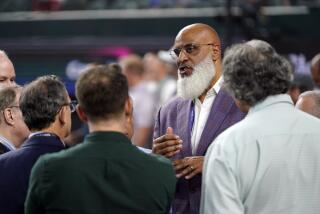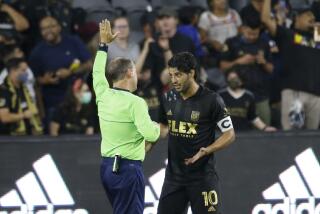Unable to Make Progress, Owners Break Off Talks on Drug Testing
- Share via
Barry Rona, chief negotiator for Commissioner Peter Ueberroth and baseball club owners, said Tuesday in New York that talks on drug testing with the players’ union have been indefinitely suspended.
Rona said that management has concluded that the union has no intention of approving testing and is merely engaged in double talk in suggesting that some day it might.
Rona said he had told Donald Fehr, leader of the Major League Players Assn., that they had had months to do their evaluations and take their stands. “I told him frankly, it’s a lot of double talk for them to say that they are still considering testing.”
He added that he had told Fehr: “Prove me wrong. You just don’t want to state categorically you’re against it.”
Fehr, also in New York, responded: “Barry knows better. Barry has been told what to say. He is locked in by his constituents. I feel sorry for him.”
Fehr confirmed, however, that the talks are off for now.
Rona said that management now has certain options in the drug testing area but would not explain them. He said, however, that management’s next move in the dispute is likely to be made before the winter meetings begin in San Diego on Dec. 9.
Last week, during the World Series, owners voted unanimously to end their joint drug agreement with the union. Under that agreement, drug testing was essentially limited to those players with known drug problems.
Ueberroth proposed Sept. 24 that the 650 major league players agree to voluntary testing by urinalysis three times a year beginning next season. He asked the players to respond in clubhouse meetings within three days, but they responded that any such plan should be negotiated through the union.
The commissioner then retreated and called for negotiations, setting a deadline of Oct. 19, the first day of the World Series. When that date arrived, however, there had been no progress and only one real negotiating session.
A check of several union and management officials and player agents Tuesday showed there is considerable disagreement over what Ueberroth and the owners may do now. There was general agreement, however, that the matter will not be left to die.
In the wake of the recent testimony in drug trials at Pittsburgh that at least seven players had bought and used cocaine and that other players were implicated in amphetamine use, Ueberroth declared that baseball must confront its drug problems. Most of the owners seem to agree.
Some think that Ueberroth may try to pressure the union and the players to go along with testing by announcing punishments of at least some of those named in the Pittsburgh trials. The rationale of such a step would be that if the players saw those named as using drugs subject to possibly long suspensions, they might be more prepared to accept preventive testing.
Ueberroth, however, has said for more than a year that he believes in fighting drugs, not players, and he has frowned on punishment. He recently said that he was considering punishing only those players who could be proved to have both bought and used drugs in ballparks. It is believed that most of the use has been outside the parks.
Others think that the next management step may be to insert drug testing clauses in individual player contracts beginning this winter. The Dodgers tried that last winter, but finally backed off when the union complained that such a move was in violation of the joint drug agreement, the very agreement management just ended.
Fehr said Tuesday that if the clubs try that move, the union will fight it as illegal. He said that drug testing would then be a condition of employment and that such conditions, by law, are subject to collective bargaining.
There was no comment on that from Ueberroth’s office.
More to Read
Are you a true-blue fan?
Get our Dodgers Dugout newsletter for insights, news and much more.
You may occasionally receive promotional content from the Los Angeles Times.








